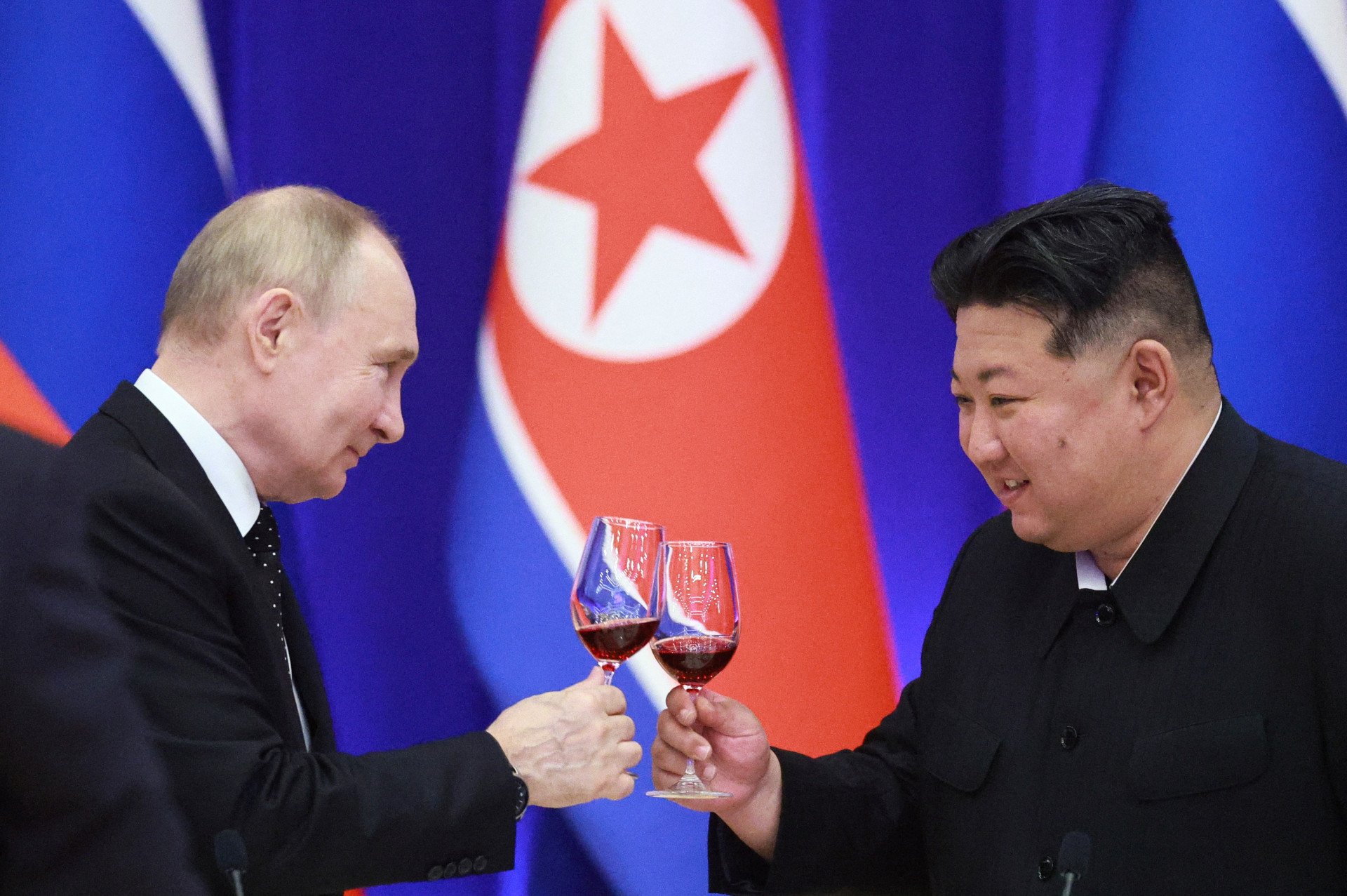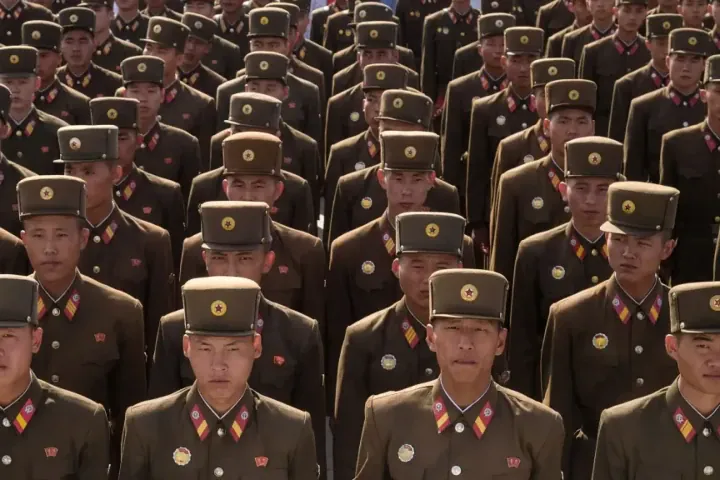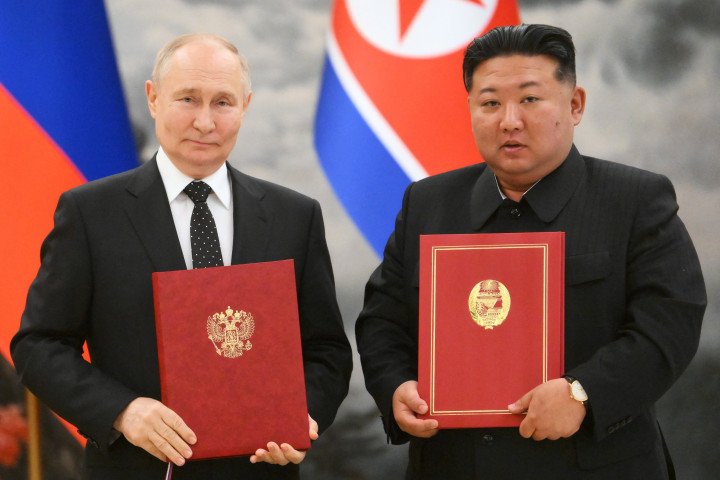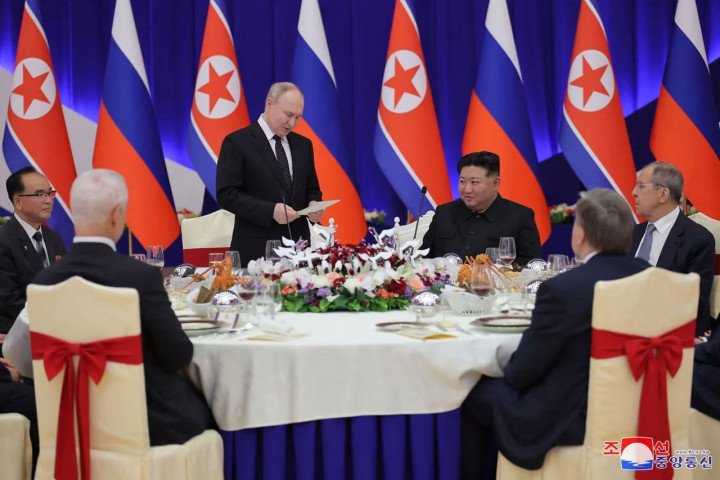- Category
- World
Will North Korea Send Troops to Fight Alongside Russia in Ukraine?

It has become clear that Kim Jong Un's and Putin's partnership extends beyond a bromance and political photo opportunities. The pressing question remains: to what extent will it evolve?
Kim Jong Un and Putin signed a “comprehensive strategic partnership” treaty, which includes provisions for mutual assistance in the event of aggression against either party. During Putin's landmark visit to North Korea, Kim called Russia "the most honest friend and ally" and Putin "the dearest friend of the Korean people."
North Korea (DPRK), however, began sending weapons and artillery to Russia long before they held hands in June 2024. The recent treaty shows that their relationship doesn’t stop at a cash-for-artillery exchange.

This alliance of authoritarian powers is undoubtedly a dangerous one, both with elitist military minds and home to nuclear weapons. With these two leaders, it’s not what they say but what they don’t say that matters. Will North Korea send its soldiers to support Russian troops and become their latest addition of ‘cannon fodder’?
The strengthening of Kim and Putin’s relations
Both Russia and North Korea are authoritarian states that seek to control their populations to achieve ultimate power and have historically had strong war rhetoric—Russia waging wars in several countries worldwide, and North Korea persistently threatening the U.S and the wider world, even stretching their threats to a film starring Seth Rogan. A state-sponsored cyberwarfare group called ‘Guardians of Peace’ hacked Sony and threatened acts of terrorism if cinemas proceeded to show the movie ‘The Interview’ which mocked the Democratic People's Republic of Korea (DPRK).
Their invasions and rogue nuclear programs have alienated them from the rest of the world and driven them closer together.
Since the full-scale invasion, North Korea has staunchly stood on Russia’s side. In 2022, its leadership stated that they officially recognized “the independence of the People’s Republic of Donetsk and the People’s Republic of Luhansk.” They expressed the will to develop state-to-state relations with “those countries” following “ideas of independence, peace and friendship.”
In January 2024, remnants of ballistic missiles made in North Korea were found in Kharkiv.
In March of 2024, South Korea’s Defense Minister, Shin Wonsik, reported that since last year, North Korea shipped around 7000 containers filled with munitions and military equipment to Russia. The containers, he said, could have been holding about 3 million rounds of 152 mm shells. In exchange for the artillery, Russia is sending North Korea food as well as parts and raw materials.
Russia also vetoed the renewal of a UN panel responsible for monitoring sanctions on North Korea’s nuclear weapons and ballistic missiles program.
Following the Kim-Putin treaty signed in June 2024, Putin stated that “Russia is considering making changes to its nuclear doctrine,” claiming that Russia is aware that an unnamed “potential adversary” is working on new elements “related to lowering the threshold for nuclear weapon use.” U.S Senators warned that Russia may be providing North Korea with stronger nuclear capabilities.
The recent meeting in DPRK motivated U.S Senators from Congress to introduce a bill officially declaring Russia a terrorist state, “Two of the most autocratic, atrocity-committing leaders in the world standing together—terrorist sponsors. Russia has deeply earned the designation to be a state sponsor of terrorism.”

The pact understandably alarmed South Korean President Yoon Suk Yeol’s office. They called the Kim-Putin pact “absurd” and said that they would now reconsider the issue of supporting Ukraine with arms. Days later, U.S. aircraft carriers arrived in South Korea demonstrating what they said was their “firm resolve to respond to the escalating threats from North Korea.”
But Russia’s and North Korea’s connection goes back further than modern times. North Korea was formed in 1948 with the backing of the then-Soviet Union. Yes, their relationship over the years has been loose, but recently, it has blossomed to a dangerous level.
North Korea dispatching force to Donetsk, July 2024
Citing a South Korean Government Official, South Korean TV network ‘TV Chosun’ reported that they “expect North Korea to dispatch a large-scale engineering force to occupied Donetsk Oblast as early as July 2024 and that the force will help rebuild infrastructure in occupied Donetsk City.”
Providing engineering support would free up Russian hands and allow them to use more of their personnel for direct fighting, along with aiding the expansion of infrastructure and fortifications in Ukraine. Neither Russia nor North Korea have confirmed nor denied whether they will be sending soldiers to fight directly on the frontlines.
Article 4 of the Kim-Putin agreement says: “In case any one of the two sides is put in a state of war by an armed invasion from an individual state or several states, the other side shall provide military and other assistance with all means in its possession without delay in accordance with Article 51 of the UN Charter and the laws of the DPRK and the Russian Federation.”
“This has been carefully worded so as not to imply automatic military intervention,” said Ankit Panda, a senior analyst at the Carnegie Endowment for International Peace. “But it certainly doesn’t rule it out.”
Should we be worried?
North Korea has one of the largest armies in the world, with around 1.3 million serving in active duty, and are the “largest possessor of chemical weapons”. They certainly have strength in numbers and nuclear weapons. However, quantity doesn’t compare to quality.
Yesterday, the DPRK fired two ballistic missiles, but one failed. Previous military reconnaissance rockets have exploded mid-flight and failed. The DPRK has often conducted military drills in response to what they deem are threats from South Korea. “Pyongyang is determined not to appear weak while South Korea conducts defense exercises with Japan and the United States” Leif-Eric Easley, professor of International Studies at the Ewha Womans University in Seoul said.
“Compared to its neighbor south of the Demilitarised Zone, Pyongyang’s forces are less well-trained, and reliant on conventional capabilities that are often from the Soviet-era” said politics lecturer, Edward Howell.
In 2023, Rimjin-gang, a North Korean news site founded by a North Korean defector—which often illegally smuggles information and images from inside the country—reported that soldiers in DPRK are facing malnutrition, much as the rest of the country's population. Soldiers have been found to be medically unfit due to disease, injury, or malnutrition. One soldier told them that the meals at the military base were “just salt and corn, not even totaling 400 grams per day’ though they had three meals per day, it was just one meal split into three,” he said.

Russia is certainly exchanging food for artillery; could this be to support the starving military? Though speculation, should that be the case, the North Korean military would not be fit to fight against the Ukrainian military successfully.
“Putin couldn't care less how many Russians die,” said Senator Graham. And with Kim’s history of mass atrocity against its own civilians through famine and labor camps, even with a weak and starving military, nothing can be ruled out.
Though this escalation in relations between the two nations is concerning for the international community, as the Pentagon’s Press Secretary aptly put it, any North Korean military personnel sent to Ukraine would simply be “cannon fodder.”
Banner photo source: Getty Images.
-46f6afa2f66d31ff3df8ea1a8f5524ec.jpg)
-bb189c4f577f5748c020e0caabba2ffd.jpg)
-65865cf743e20f7e38aac5576d55e66c.jpg)
-98d31b238962988a82662dd1f44a2cd4.jpg)
-206008aed5f329e86c52788e3e423f23.jpg)
-aaca08d17834dc695b5a72974ac4305b.png)
-605be766de04ba3d21b67fb76a76786a.jpg)